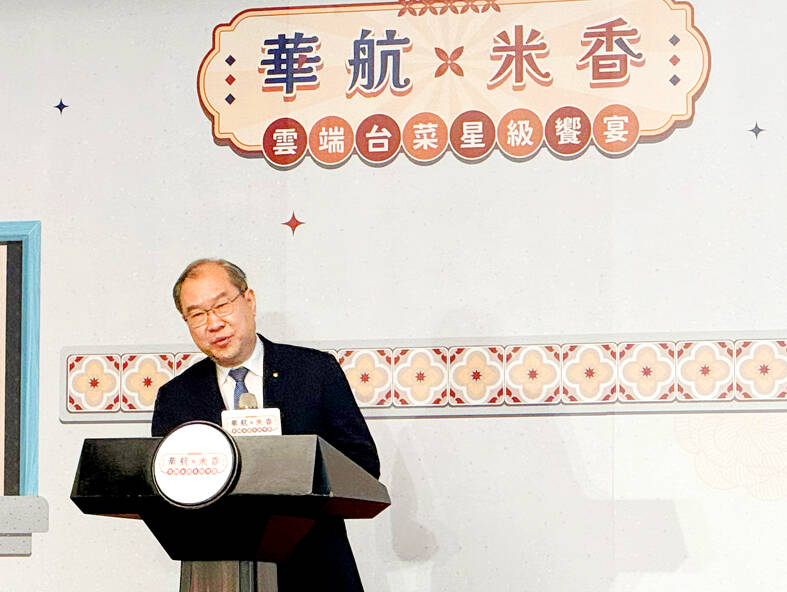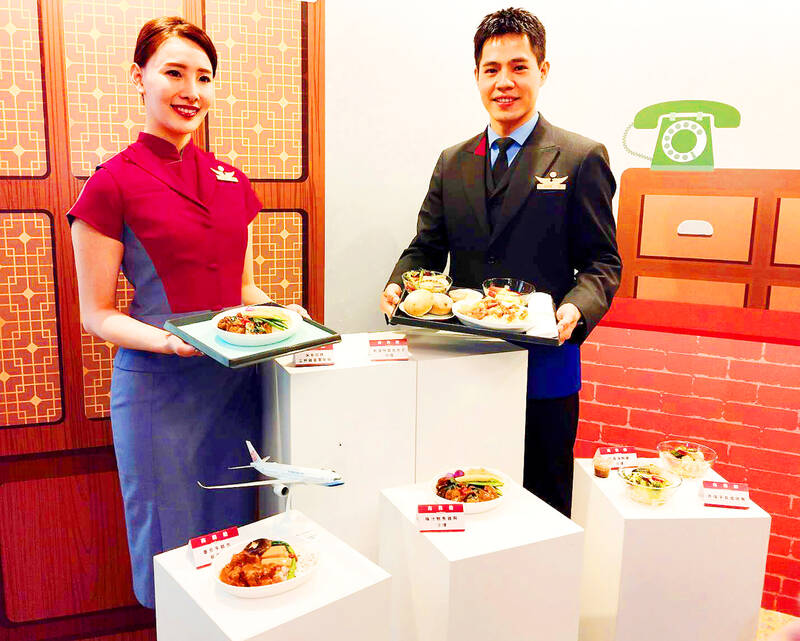China Airlines Ltd (中華航空) yesterday said that it is optimistic about this year’s business outlook, and expects to receive five Airbus SE 321neo passenger aircraft and three Boeing Co 777F cargo jets as the airline continues to renew its fleet and enhance its overall performance.
The airline plans to retire its fleet of Boeing 737-800 passenger planes in phases to maintain stability in its regional flight schedule, China Airlines president Kao Shing-hwang (高星潢) said on the sidelines of a news conference in Taipei, at which the airline introduced new in-flight meals designed by chefs at Grand Mayfull Hotel Taipei (台北美福大飯店).
China Airlines is to continue its fleet renewal as the airline positions itself for future growth, with plans to lease at least one Airbus 350-900 passenger plane this year and introduce 24 Boeing 787 passenger planes from next year to 2028 to improve its operating efficiency on long-haul routes, it said at an earnings conference in November last year.

Photo: CNA
The airline is also looking to accelerate the retirement of its Boeing 747-400F cargo jets this year to reduce fuel costs, it added.
Kao said the airline is still in the process of developing new routes. Earlier this month, the airline announced that it would begin a nonstop service between Taiwan Taoyuan International Airport and Seattle on July 14 after a 16-year hiatus.
China Airlines joins US carrier Delta Air Lines Inc and fellow Taiwanese carriers EVA Airways Corp (長榮航) and Starlux Airlines Co (星宇航空) in adding a nonstop service to Seattle this year as airlines expand their North American network of destinations to take advantage of growing demand for travel between Taiwan and the US.

Photo: CNA
While the direct flights to Seattle offered by rival carriers would increase competition, China Airlines does not expect a significant impact on its ticket prices given robust demand, Kao said.
China Airlines last year posted revenue of NT$184.82 billion (US$5.78 billion), a 22.6 percent year-on-year increase, driven by a 354.14 percent surge in passenger revenue of NT$115.72 billion, despite a setback in cargo revenue compared with a year earlier.
The airline’s net profit surged 138.47 percent year-on-year to NT$6.82 billion last year, while earnings per share rose to NT$1.13 from NT$0.48, company data showed.
China Airlines’ new in-flight meals are available on Taiwan-China and Taiwan-Southeast Asia routes, as well as some flights to Japan and South Korea, starting on Monday next week, the airline said.

Intel Corp chief executive officer Lip-Bu Tan (陳立武) is expected to meet with Taiwanese suppliers next month in conjunction with the opening of the Computex Taipei trade show, supply chain sources said on Monday. The visit, the first for Tan to Taiwan since assuming his new post last month, would be aimed at enhancing Intel’s ties with suppliers in Taiwan as he attempts to help turn around the struggling US chipmaker, the sources said. Tan is to hold a banquet to celebrate Intel’s 40-year presence in Taiwan before Computex opens on May 20 and invite dozens of Taiwanese suppliers to exchange views

Application-specific integrated circuit designer Faraday Technology Corp (智原) yesterday said that although revenue this quarter would decline 30 percent from last quarter, it retained its full-year forecast of revenue growth of 100 percent. The company attributed the quarterly drop to a slowdown in customers’ production of chips using Faraday’s advanced packaging technology. The company is still confident about its revenue growth this year, given its strong “design-win” — or the projects it won to help customers design their chips, Faraday president Steve Wang (王國雍) told an online earnings conference. “The design-win this year is better than we expected. We believe we will win

Chizuko Kimura has become the first female sushi chef in the world to win a Michelin star, fulfilling a promise she made to her dying husband to continue his legacy. The 54-year-old Japanese chef regained the Michelin star her late husband, Shunei Kimura, won three years ago for their Sushi Shunei restaurant in Paris. For Shunei Kimura, the star was a dream come true. However, the joy was short-lived. He died from cancer just three months later in June 2022. He was 65. The following year, the restaurant in the heart of Montmartre lost its star rating. Chizuko Kimura insisted that the new star is still down

While China’s leaders use their economic and political might to fight US President Donald Trump’s trade war “to the end,” its army of social media soldiers are embarking on a more humorous campaign online. Trump’s tariff blitz has seen Washington and Beijing impose eye-watering duties on imports from the other, fanning a standoff between the economic superpowers that has sparked global recession fears and sent markets into a tailspin. Trump says his policy is a response to years of being “ripped off” by other countries and aims to bring manufacturing to the US, forcing companies to employ US workers. However, China’s online warriors